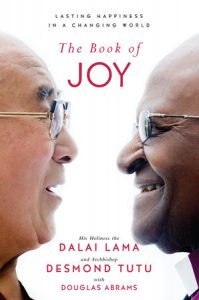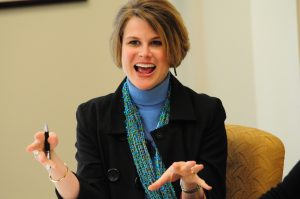A newly released book featuring the wisdom of two of the world’s greatest spiritual leaders — Archbishop Emeritus Desmond Tutu of South Africa and the Dalai Lama of Tibet — cites research on forgiveness by Dr. Charlotte van Oyen Witvliet of the Hope College psychology department.

In The Book of Joy: Lasting Happiness in a Changing World, Tutu and the Dalai Lama begin by discussing obstacles to joy: fear, anger, and adversity. Then, co-author Douglas Abrams, who was present during their unprecedented five-day meeting, weaves in current scientific research to support the eight pillars of joy espoused by the two Nobel Peace Laureates: perspective, humility, humor, acceptance, forgiveness, gratitude, compassion and generosity. One of the findings of Witvliet’s two-decades-worth of dedication to researching forgiveness and forgiveness practices reveals that while forgiving is a moral response to injustice in a relationship, it also has beneficial emotional and physiological side effects for the forgiver. It is this revelation — first discovered by Witvliet and co-investigators Dr. Thomas Ludwig, professor of psychology, and Kelly Chamberlain ’01 Port 15 years ago — that makes its appearance in The Book of Joy.
…Witvliet’s two-decades-worth of dedication to researching forgiveness and forgiveness practices reveals that while forgiving is a moral response to injustice in a relationship, it also has beneficial emotional and physiological side effects for the forgiver.
In that study, Witvliet and her team looked at forgiving and unforgiving responses to being wronged or hurt. First, she asked people in the study to think about someone in their autobiographical past who had mistreated or offended them in a way that still hurt them. Then, in the midst of their rumination about the hurt, Witvliet monitored their heart rate, facial muscles, and sweat glands.
What she found when people remembered and harbored their grudges was that they physiologically responded with fight-or-flight mechanisms — their heart rates increased, their blood pressures went up, they sweated more. Their facial musculature also showed signs of anger and sadness. This all makes sense, of course.

But Witvliet did not stop there. She then asked people in the study to imagine bestowing empathy and an understanding of their offenders’ need for transformation. In short, she asked them to begin to forgive their offenders by developing even small ways to genuinely show mercy, compassion and goodwill. And in trial after trial, Witvliet found a very clear and clean story: When people engage in the moral response of actual, sincere forgiveness, their bodies respond with heart rates, blood pressures and sweat responses that return to normal.
“And while we recognize that forgiving is not relaxing,” says Witvliet, “compared to its unforgiving alternative, forgiveness evokes calmer responses during the imagery and also during the recovery period.”
“What we have been really trying to do in our work is not just restrain and push down the negative but also cultivate approaches people can take to remember the personhood of the offender, to see the wrongdoing as evidence of his or her need to be transformed, and to genuinely desire that good change in them. It is these responses that actually generate positivity and joy.” — Dr. Charlotte vanOyen Witvliet
But for lasting benefits, Witvliet is quick to say that the goal of these findings goes beyond the lab. “From this, I don’t construe forgiving as what can I get out of this situation,” she says, clamping her hand over her heart, “but it’s really a generous gift of mercy and level-headed, eyes-wide-open compassion.
“Too often when we start to think about forgiving someone, we think, ‘We can’t be mean, we can’t be nasty, we can’t be bitter, we can’t be hostile, we can’t be this, and we can’t say that. We can’t, we can’t,’” she continues to explain. “Well, we can turn off that negative spigot in the short term through suppression and restraint, but our studies show over and over again, that that alone does not generate anything positive or pro-social and it does not activate empathy or forgiveness. Instead we must root out resentment by cultivating a long-term sustainable alternative.”
And what is that exactly? Well, Witvliet likes to use a garden metaphor to explain. Think of pulling a weed in a garden, a thorny weed of resentment. We can dig it up but that does not mean it won’t sprout back again. So, Witvliet says we must refine the garden’s soil over and over again by planting others things like truth and justice, compassion and mercy that can crowd the weeds of un-forgiveness and bitterness, creating a more beautiful garden because forgiveness is variegated. It grows best with continual care and a readiness to get our trowels out.
Whether from the Dalai Lama’s basic Buddhist principles or Tutu’s belief in Jesus’s commands to love our enemies, a theological clarity and message abides from these octogenarians. Forgiveness, for all of its difficulty and hard work they say, is just the right thing to do.
“What we have been really trying to do in our work is not just restrain and push down the negative but also cultivate approaches people can take to remember the personhood of the offender, to see the wrongdoing as evidence of his or her need to be transformed, and to genuinely desire that good change in them. It is these responses that actually generate positivity and joy,” continues Witvliet.
And that brings us back around to Tutu and the Dalai Lama and The Book Of Joy. These two religious leaders have experienced numerous hardships, oppressions and reasons to forgive in their lifetimes, yet they are two of the most joyful souls who walk amongst us. Whether from basic Buddhist principles or the belief in Jesus’s commands to love our enemies, a theological clarity and message abides from these octogenarians. Forgiveness, for all of its difficulty and hard work, they say, is just the right thing to do to lead a joyful life.

